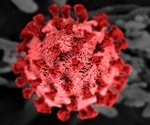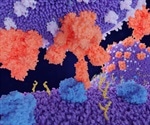
Latest Type 2 Diabetes News and Research
Corn-based diet with flavonoids alleviates IBD-like symptoms in mice
Flavonoids from a specific line of corn act as anti-inflammatory agents in the guts of mice with an inflammatory-bowel-disease-like condition, according to a team of researchers who said flavonoid-rich corn should be studied to determine its potential to provide a protective effect on human health.
7 in 10 U.S. adults worry poor health will limit their life experiences, survey finds
Seven in 10 U.S. adults worry poor health will prevent them from doing all the things they'd like to do in life, according to a new survey from the American Heart Association and American Diabetes Association.
Study reveals a new way to determine the age of insulin-storage parcels
A study in the Journal of Biological Chemistry describes a new way to determine the age of insulin-storage parcels, known as granules, and sheds light on how their age affects their release into the bloodstream.
Study shows how non-alcoholic fatty liver disease causes Alzheimer's-like neuroinflammation
Research from University of South Carolina associate professor Saurabh Chatterjee's laboratory in Environmental Health Sciences, Arnold School of Public Health, and led by Ayan Mondal, a postdoctoral researcher from the same lab, has revealed the cause behind the previously established link between non-alcoholic fatty liver disease (i.e., NAFLD, recently reclassified as metabolic associated fatty liver disease or MAFLD) and neurological problems.
Arrhythmic gut bacteria signatures predict type 2 diabetes risk
The microbial composition of the intestines is complex and varies widely from one individual to another. Many factors such as environmental factors, lifestyle, genetics or illnesses affect the intestinal ecosystem of helpful gut bacteria.
New guidelines on assessment and management of type 2 diabetes in children, adolescents
A team of paediatric specialists, including an expert from the University of Adelaide, has produced new guidelines regarding assessment and management of type 2 diabetes (T2D) in Australian and New Zealand children and adolescents.
Study: Oats and rye brans reduce weight gain, hepatic inflammation
In a newly published experimental study, the consumption of dietary fibre from oat and rye brans supported the growth of beneficial gut microbiota, which in turn ameliorated cholesterol metabolism, enhanced gut barrier function and reduced hepatic inflammation.
Extended culture of human pancreatic slices as a model to study regeneration of beta cells
Scientists from the Diabetes Research Institute (DRI) at the University of Miami Miller School of Medicine have developed a method allowing for the long-term culture of "pancreatic slices" to study the regeneration of the human pancreas in real time.
Study: East Germany has more hospitalizations for heart failure compared to West Germany
East Germany has many more hospitalisations for heart failure compared to West Germany despite a nationwide healthcare system, according to research presented today on HFA Discoveries, a scientific platform of the European Society of Cardiology (ESC).
Alzheimer’s drug could be re-purposed to reverse blood vessel damage in diabetes
Drugs that were developed to treat Alzheimer’s Disease could be re-purposed to prevent - or even reverse - the damage done to the blood vessels in people who are obese or suffer from type 2 diabetes, according to new research.
Menopause can increase risk of metabolic syndrome, shows study
Perimenopause is a time when women become more vulnerable to a number of health problems. A new study based on data from the Canadian Longitudinal Study on Aging identified menopause as a risk factor for the development of metabolic syndrome or some of its components, including hypertension, central obesity, and high blood sugar. Study results are published online today in Menopause, the journal of The North American Menopause Society (NAMS).
BMI should be assessed in management of COVID-19 patients
A new study published on the preprint server medRxiv* in June 2020 reports that obesity is a risk factor of composite poor outcome of COVID-19 disease. On the other hand, COVID-19 patients with 'composite poor outcome' have higher BMI. Therefore, BMI should be assessed in the management of COVID-19 patients, and special attention should be given to patients with obesity.
Genes associated with SARS-CoV-2 human lung cell infection
Now, a new study published on the preprint server bioRxiv in June 2020 attempts to make sense of this data to identify viral genes that are explicitly expressed in the cells infected by severe acute respiratory syndrome coronavirus 2 (SARS-CoV-2). This could help reveal new therapeutic targets.
New study comprehensively profiles environmental factors linked to childhood obesity
Childhood obesity is a health threat that is becoming more and more common worldwide. It increases risk later on for a variety of life-threatening challenges, including type 2 diabetes, cancer, heart disease, and even mental health problems.
Obesity and COVID-19: Cause or effect?
A new University College London study published on the preprint server medRxiv in June 2020 dissects the contribution and incidence of obesity in the ongoing COVID-19 pandemic and describes measures to mitigate the impact of lockdown measures.
PCOS subtypes associated with distinct genetic variations, finds study
Researchers working on a National Institutes of Health (NIH) funded study found that polycystic ovary syndrome (PCOS) has distinct subtypes that are associated with genetic variations.
Evidence of link between ACE2 genotype and COVID-19 disease severity
A new study published on the preprint server medRxiv in June 2020 shows that variants in the ACE2 gene which encodes the enzyme receptor for severe acute respiratory syndrome coronavirus 2 (SARS-CoV-2), the virus that causes COVID-19 disease, are linked to the risk of severe disease.
Smoking increases risk of COVID-19 for men but not women
Even as the COVID-19 pandemic continues to spread over the world, scientists have had to come to terms with the fact that they don’t know much about the SARS-CoV-2 or the disease it causes. Now, a new study by researchers at the University College Cork, Ireland, and published on the preprint server medRxiv in June 2020 discusses the differences in COVID-19 risk between men and women who smoke.
Chemist develops new drug to treat type 2 diabetes without undesired side effects
Syracuse University chemistry professor Dr. Robert P. Doyle has developed a new drug lead to treat type 2 diabetes in millions of patients who are seeking to better control their blood sugar without the common side effects of nausea, vomiting, and in select cases, undesired weight loss.
PCORI approves up to $50 million in funding for new projects to address COVID-19
The Patient-Centered Outcomes Research Institute (PCORI) Board of Governors today, building on its rapid response to the COVID-19 health crisis, approved allocating up to $50 million in additional funding for new projects in PCORI's COVID-19 funding opportunities, as well as enhancements to existing PCORI-funded studies.


_1b78fec41a5143afb6e7b9ad317023d2-150x125.jpg)

















































No hay comentarios:
Publicar un comentario